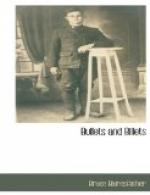A shell hole of large proportions had rent a gash in the outer front wall, leaving the window woodwork, bricks and wall-paper piled up in a heap on the floor, partially obliterating a large writing desk. Private papers lay about in profusion, all dirty, damp and muddy. The remains of a window blind and half its roller hung in the space left by the absent window, and mournfully tapped against the remnant of the framework in the light, cold breeze that was blowing in from outside. Place this scene in your imagination in some luxuriant country vicarage in England, and you will get an idea of what Belgium has had to put up with from these Teutonic madmen. I went into all the rooms; they were in very much the same state. In the back part of the house the litter was added to by empty tins and old military equipment. Soldiers had evidently had to live there temporarily on their way to some part of our lines. I heard a movement in the room opposite the one I had first gone into; I went back and saw a cat sitting in the corner amongst a pile of leather-backed books. I made a movement towards it, but with a cadaverous, wild glare at me, it sprang through the broken window and disappeared.
The church was just opposite the priest’s house. I went across the road to look at it. It was a large reddish-grey stone building, pretty old, I should say, and surrounded by a graveyard. Shell holes everywhere; the old, grey grave stones and slabs cracked and sticking about at odd angles. As I entered by the vestry door I noticed the tower was fairly all right, but that was about the only part that was. Belgium and Northern France are full of churches which have been sadly knocked about, and all present very much the same appearance. I will describe this one to give you a sample. I went through the vestry into the main part of the church, deciding to examine the vestry later. The roof had had most of the tiles blown off, and underneath them the roofing-boards had been shattered into long narrow strips. Fixed at one end to what was left of the rafters they flapped slowly up and down in the air like lengths of watch-spring. Below, on the floor of the church, the chairs were tossed about in the greatest possible disorder, and here and there a dozen or so had been pulverized by the fall of an immense block of masonry. Highly coloured images were lying about, broken and twisted. The altar candelabra and stained-glass windows lay in a heap together behind a pulpit, the front of which had been knocked off by a falling pillar. One could walk about near some of the broken images, and pick up little candles and trinkets which had been put in and around the shrine, off the floor and from among the mass of broken stones and mortar. The vestry, I found, was almost complete. Nearly trodden out of recognition on the floor, I found a bright coloured hand-made altar cloth, which I then had half a mind to take away with me, and post it back to some parson in England to put in his church. I only refrained from carrying out this plan as I feared that the difficulties of getting it away would be too great. I left the church, and looked about some of the other houses, but none proved as pathetically interesting as the church and the vicar’s house, so I took my way out across the fields again towards the Douve farm.




